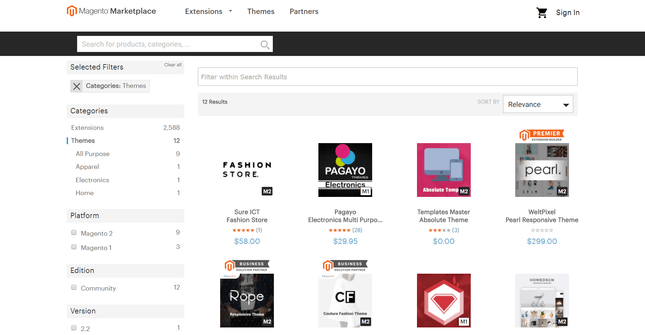Once you have finished arranging, the time comes to start chipping away at breathing life into your eCommerce website. You have a dream of what you need to choose and you have your goals in mind. Now the time has come to realize this vision by creating a store that perfectly reflects your idea.
Regardless, you will consider using one of the eCommerce platforms as a website integration that will enable you to take advantage of many features to set up and manage an online store.
Shopify
Shopify currently has over 400,000 active online shops. The eCommerce platform is continually evolving with new apps and extensions, growing in popularity, especially among beginners. The eCommerce platform offers:
- Free SSL Certificate
- Free 14-day trial
- Manual order creation
- Website and blog
- Tracking sales
There are three evaluating plans, starting from Basic Shopify, available at $29 per month. For a growing business, you should want to consider Shopify plan or even Advanced Shopify which includes more advanced features, for example, reports. Shopify Plus is an enterprise-grade arrangement yet to find out more, you should send an inquiry. At last, if you want to sell on Facebook exclusively, you should want to explore alternatives offered by Shopify Lite, available at $9 per month.
Ability to connect with a Facebook page and sell on this informal community, just as a mobile-friendly shopping cart, are the features that certainly make Shopify a platform suitable for reaching online users. The process of using the platforms is additionally pretty clear with simple design and integration of 70 external payment gateways, making accepting payments easy.
SEO tools and secure facilitating are also benefits offered by the eCommerce platform. The primary disadvantage is the way that running the store may become somewhat exorbitant, with extra extensions which are paid separately, or when you don’t use Shopify Payment, in which case extra transaction fee is applied for every sale.
BigCommerce
Capacity to connect with a Facebook page and sell on this informal organization, just as a mobile-friendly shopping cart, are the features that certainly make Shopify a platform suitable for reaching online users. The process of using the platforms is also pretty clear with simple design and integration of 70 external payment gateways, making accepting payments easy.
SEO tools and secure facilitating are additionally benefits offered by the platform. The main downside is the fact that running the store may become somewhat expensive, with extra extensions which are paid separately, or when you don’t use Shopify Payment, in which case extra transaction fee is applied for every sale.
- Unlimited staff accounts
- Single page checkout
- Professional reporting tool
- No transaction fee
- Product ratings
- Unlimited product and file storage
There are relatively few modules choosing the eCommerce platform itself is very customizable and already provides a set of integrations to help you optimize and support the performance of the online store. The plans start with the Standard arrangement, the most popular plus plan and Pro plan. At last, there is the most advanced solution called Enterprise, however to get more details, you should get in contact with the customer support. There is a 15-day free time for testing.
Magento

Another established name in the realm of eCommerce is Magento, offering solutions for private ventures, just as advanced technology and reliability recognized by some of the top players on the market, including Coca Cola, Charlotte Tilbury, Burger King, etc. Over 250,000 merchants are using the platform to grow their businesses and increase sales. Some of the available features the software comes with are:
- Tools to draw in and retain customers
- Item packaging, gift with purchase, and customer reviews
- Flexibility to customize the platform to provide branded experience
- A huge number of plugins and extensions
- Extensive documentation and resources
- Open source platform
For beginners, Magento offers a free Magento Community Edition platform. It is a good way to experiment with the features and learn how to integrate and grow your eCommerce business with this platform. There is no clear estimating on the website regarding solutions for growing businesses and large enterprises. The best way to find out more is to schedule a free product demo.
WooCommerce
WooCommerce is an ideal eCommerce solution if your blog is hosted on WordPress platform. The software is specifically designed in view of WordPress, giving hundreds of free and paid extensions to help you completely customize the store based on your requirements. The software seamlessly integrates with WordPress, and it offers easy relocation from other platforms. Features provided by WooCommerce include:
- Marketplace with free and paid extensions
- Selling both physical and advanced products worldwide
- Comprehensive documentations related to setup, extending, theming, etc
- Mobile-friendly platform
- Pre-installed payment gateways
- Geo-location bolster making shipping and duty calculation simpler
- SEO-friendly platform
- Unlimited number of products
- Secure code
WooCommerce offers a self-hosted solution, which means you retain full ownership of the data and information shared through your eCommerce platform. There are no transaction fees, and you will have bolster available for all the paid products provided by WooCommerce. Getting started is free. You will sign in to your WordPress account and go from that point. To get the most out of your store, you will presumably need to use some of the extensions, Such as:
- WooCommerce Subscriptions – If you are going to use recurring charging to your membership website
- Products Add-Ons – To create extra alternatives for products, including select boxes, text areas, custom price input, etc.
- WooCommerce Bookings – It enables appointment appointments all alone website
- Stripe – It allows accepting different credit cards directly in your store
- Product bundles – It is used to create customizable offers and product bundles
The purpose of these extensions is to provide advanced features and functionalities for maintaining an eCommerce business platform, which is the reason it merits exploring the features and how those can help with upgrading and improving your store and customer experience.

